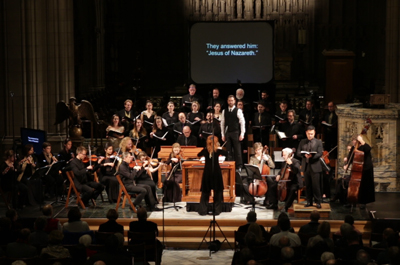by Nicholas Jones

There was drama aplenty in Apollo’s Fire’s energetic and stirring presentation of Bach’s St. John Passion this weekend, directed by Jeannette Sorrell. I was able to hear Friday evening’s performance in First Baptist Church of Shaker Heights.
Central to the Passion’s theatrical intensity was tenor Nicholas Phan’s riveting performance as the Evangelist John, who recounts the whole story. Phan’s sensitive and flexible emotive power were remarkable. No less amazing was his skill at delivering long and tongue-twisting passages (in German) with speed and musicality.
The role of Jesus was sung by baritone Jesse Blumberg with dignity and assurance, particularly in his complicated interactions with Pontius Pilate. Pilate was represented by baritone Jeffrey Strauss, who with emphatic presence in gesture and music captured the anguish of this rationalist governor, torn between a mystical prophet and an angry mob. At times Strauss strode to the front of the stage as if confronting the people of Jerusalem, angrily crying out, “Would you have your King crucified?”
Other roles were played in sudden bursts of intensity by members of Apollo’s Singers: the maidservant (Madeline Apple Healey) who confronts Peter (Corey Shotwell), and the servant (Owen McIntosh) who strikes Jesus for daring to talk back to the high priest.
The story of the crucifixion is full of incident, but Bach’s liturgical purpose — the Passion was written to be part of a church service — left him room for contemplation as well as drama. The arias are reflective moments in which the drama shifts from Jerusalem to Leipzig and from biblical characters to modern sensibilities full of guilt, anger, and sin. Like saints around the cross in a Renaissance painting, the soloists enact their own highly ambivalent responses to what they witness.
High points among the arias were Nicholas Phan’s stunning portrayal of shame and longing in “Ach, mein Sinn,” and Amanda Forsythe’s masterfully resonant song of faith, “Ich folge dir gleichfalls.” Bass soloist Christian Immler was effective in “Eilt, ihr angefochtnen Seelen,” a deeply agitated invitation to Golgatha. Countertenor Terry Wey, overbalanced by the orchestra in his first aria, came across clearly in “Es ist vollbracht,” the beautiful aria that contemplates the moment of Jesus’s death.
Joining the vocal soloists in the arias were a number of excellent instrumentalists, including Kathie Stewart (flute), Debra Nagy (oboe and oboe da caccia), Kathryn Montoya (oboe), Rebecca Landell Reed (viola da gamba), and concertmaster Olivier Brault (playing viola d’amore with Karina Schmitz). René Schiffer (cello), sometimes accompanied by Sue Yelanjian (contrabass), played nearly all the arias, choruses, and (with notable expressiveness) the recitative narratives of the Evangelist.
The chorus — joined by the soloists — was powerful and dramatic, both in its role as the people of Jerusalem and in the Lutheran hymn chorales that give a welcome respite to the intensity of the action. In a commendable effort to involve the audience further in the role of the chorus as “mob,” about half of the chorus members sang for a time from the side aisles. But their distance from the conductor led to ensemble problems and severely interfered with Bach’s intricate and balanced counterpoint.
The Passion was sung in the original German, and in a admirable move to draw the audience out of the program booklets and into the onstage action, English supertitles were projected. Unfortunately, the translations were overly literal (“you holy bones” for “ihr heiligen Gebeine”) and often unclear.
Next week, Apollo’s Fire takes the St. John on tour to New York and Michigan.
Photo from Trinity Cathedral performance, March 5, 2016 courtesy of Apollo’s Fire.
Published on ClevelandClassical.com March 7, 2016.
Click here for a printable copy of this article



